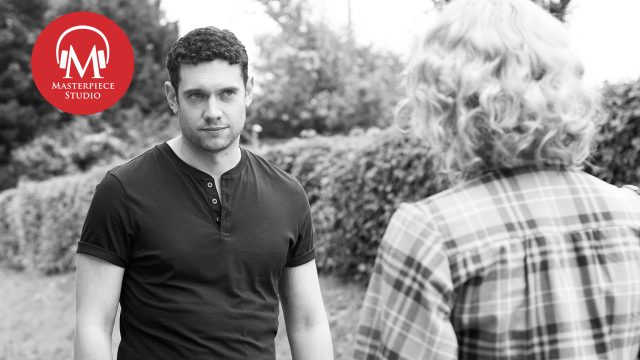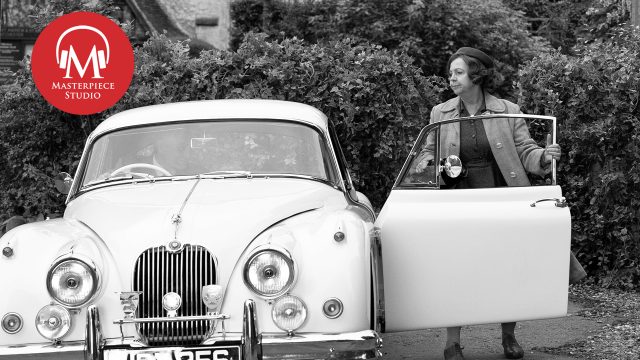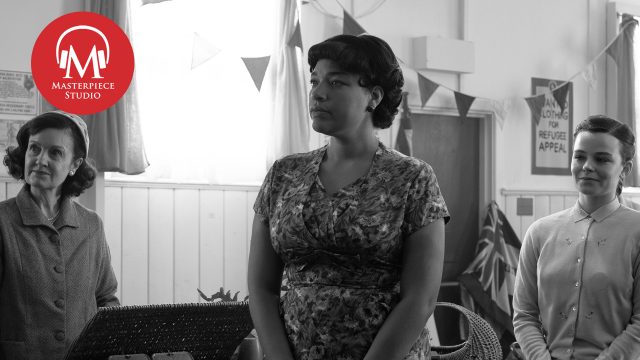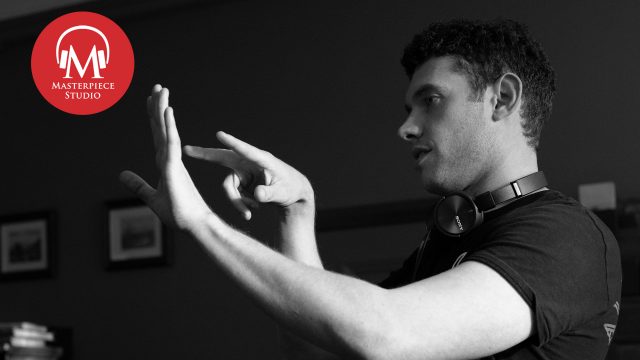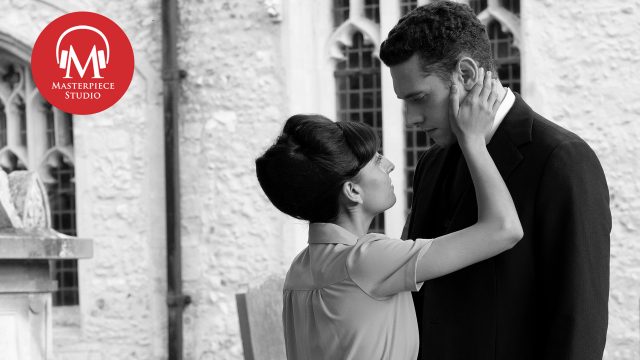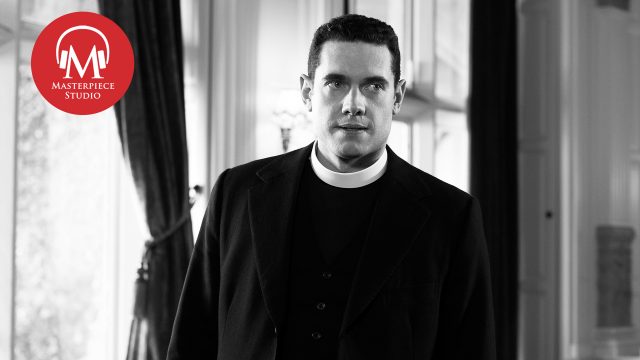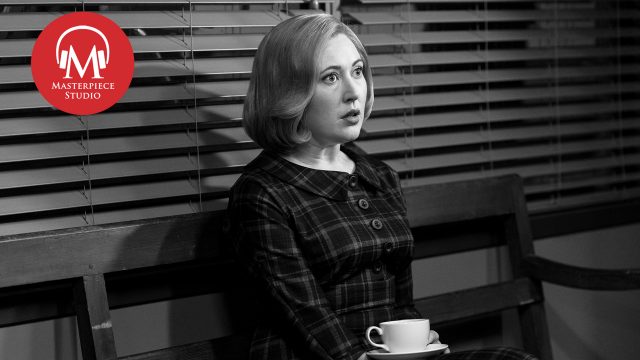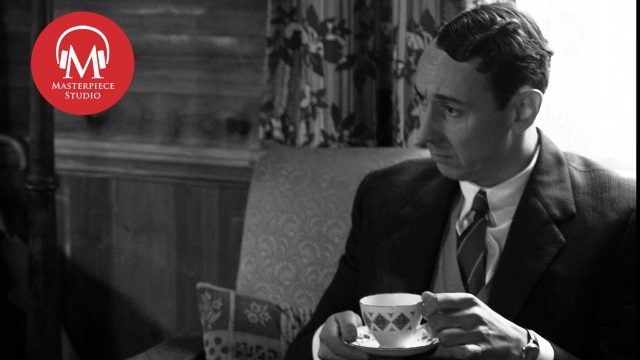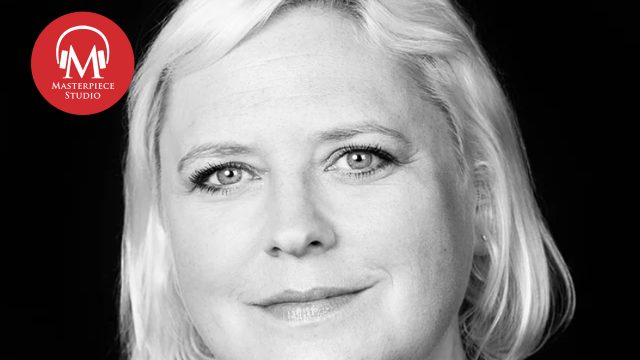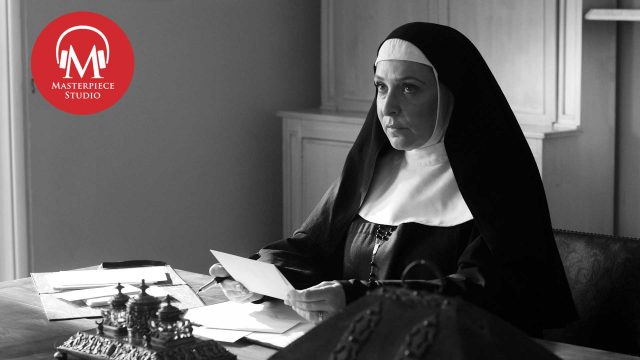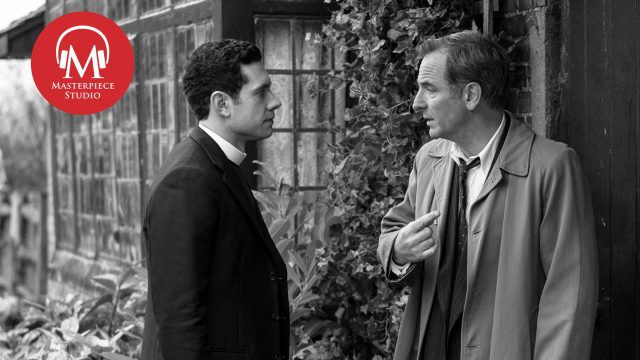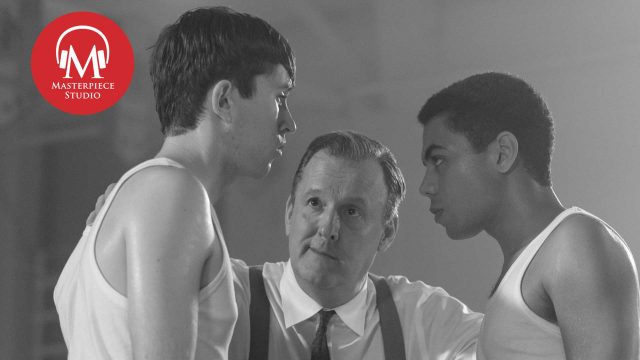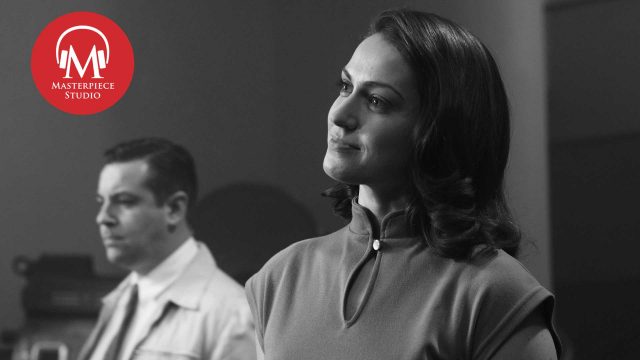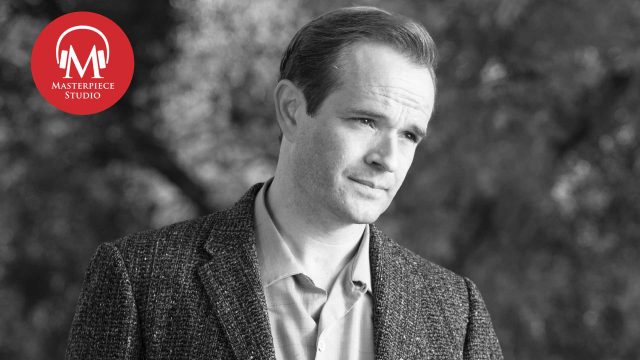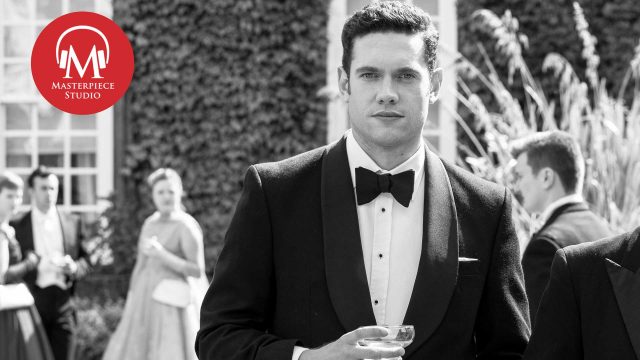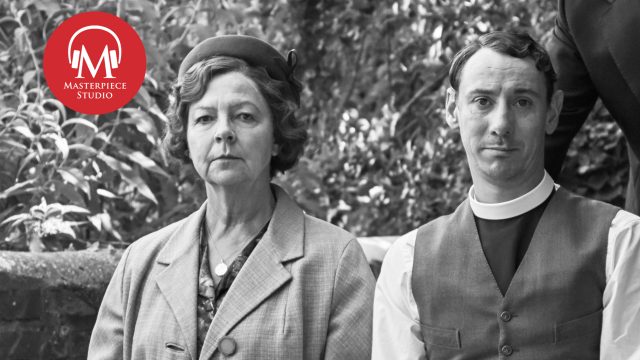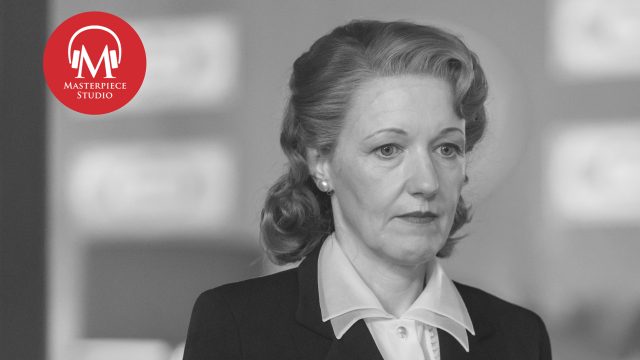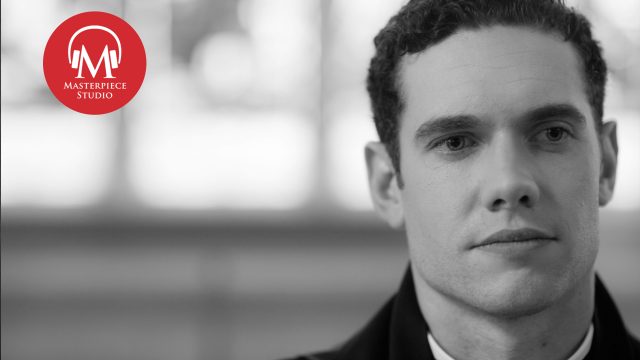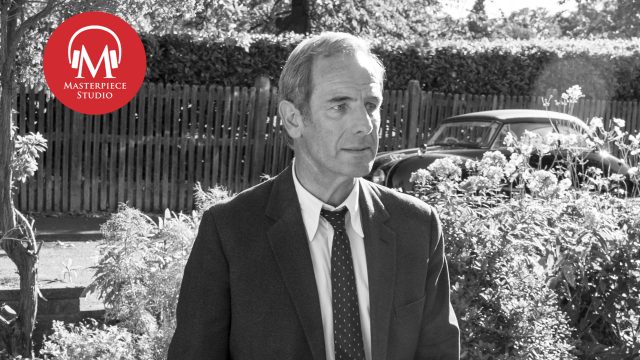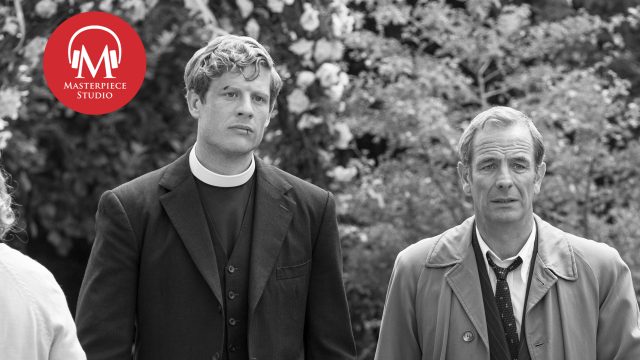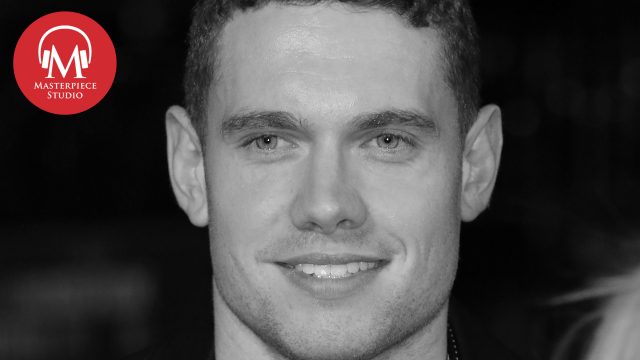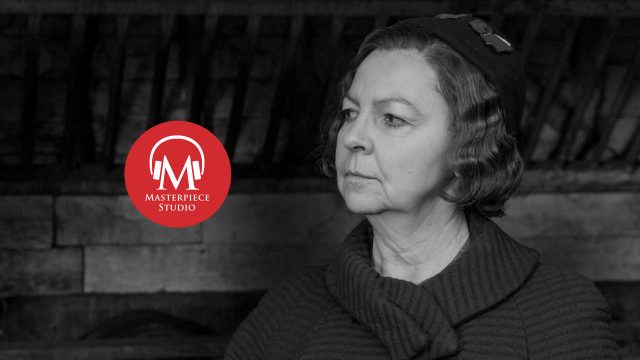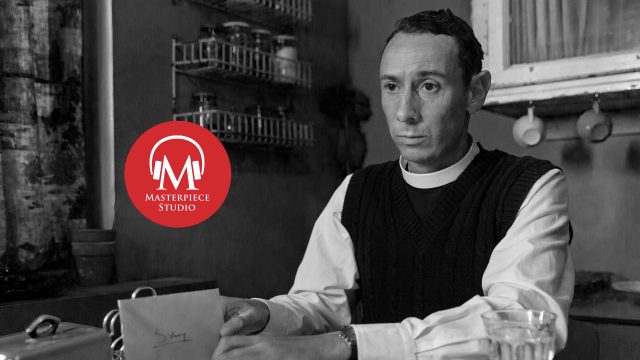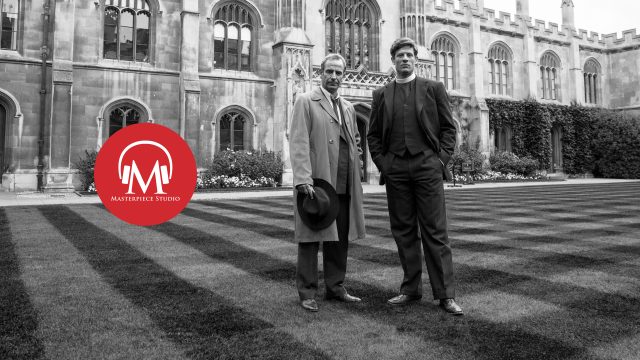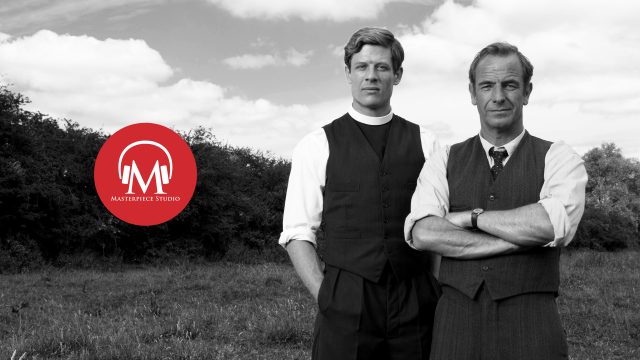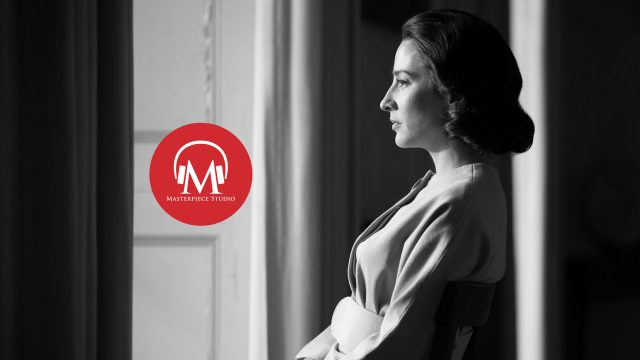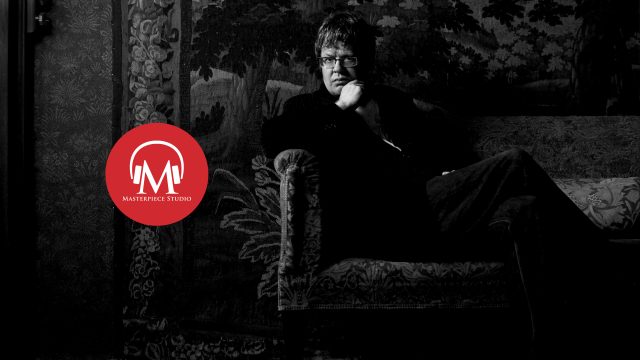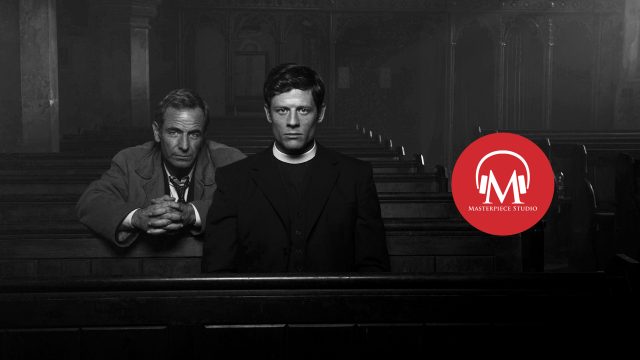After a particularly cinematic episode of Grantchester, we head behind the camera for a conversation with episode director Christiana Ebohon-Green. With hints of classic film noir and Hollywood’s golden age sprinkled throughout a classic picture house crime scene, Ebohon-Green reveals where she and the creative team turned for inspiration.
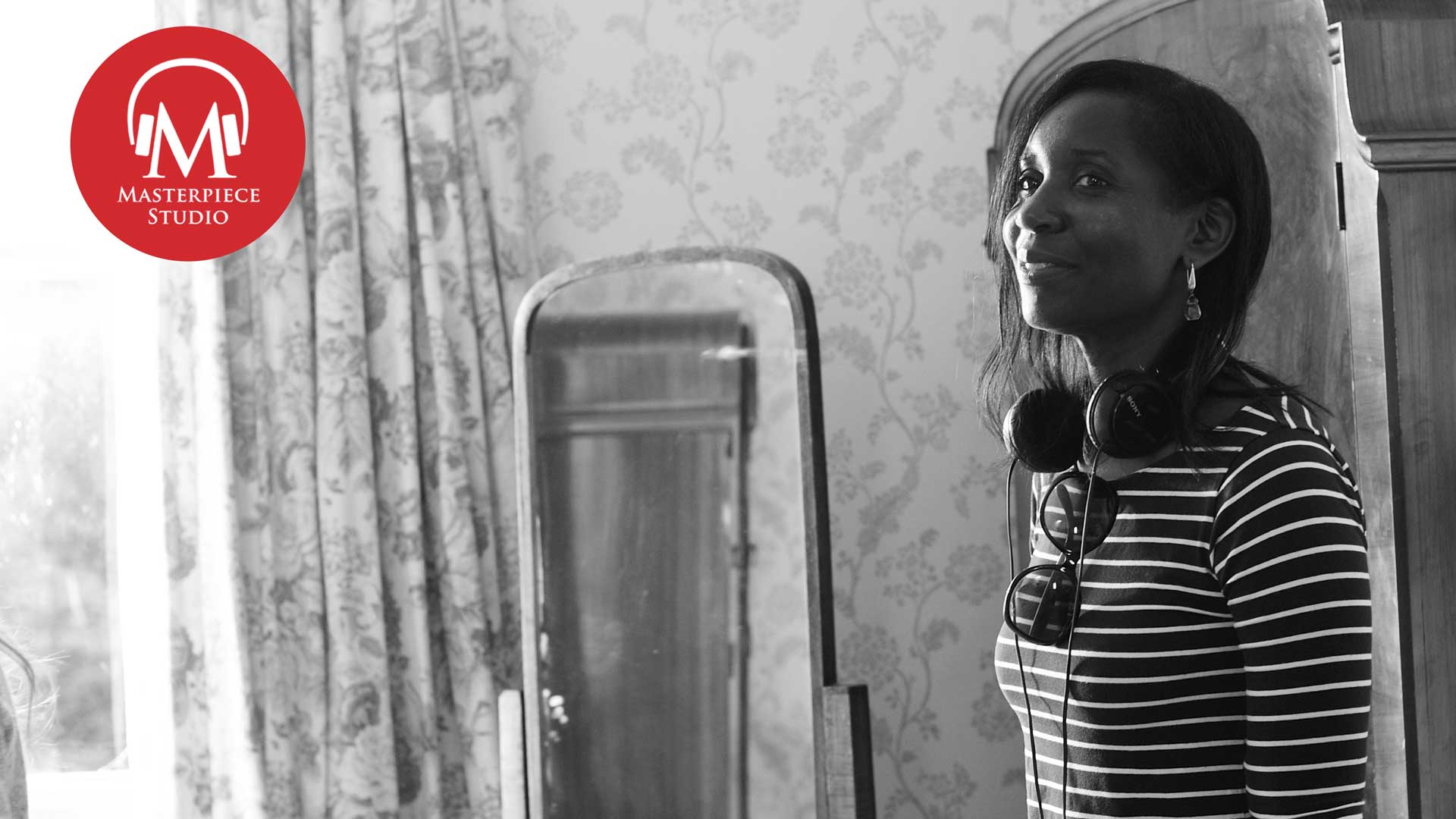

Christiana Ebohon-Green Brings Classic Cinematic Flair Behind The Camera
Released 36:33
Related to: Grantchester, Season 5
Download and subscribe on: iTunes | Spotify| RadioPublic
Transcript
Jace Lacob: I’m Jace Lacob, and you’re listening to MASTERPIECE Studio.
It’s a trip to the cinema this week on Grantchester, with would-be starlets, delusional screenwriters and star-crossed lovers wandering the village green.
CLIP
Wyatt I’m on the blacklist. Just another victim of Senator McCarthy’s witch hunt.
Larry They think you’re a witch?
Geordie Don’t they have a news section in the Beano, Larry?
Larry Have you met anybody famous?
Wyatt Marlon Brando’s a sweet guy. Doris Day’s a gas. John Wayne, not so much.
Jace The projectionist at the Beaumont Cinema meets his maker in a gruesome murder scene, and Geordie and Will are left with a blonde bombshell of a cigarette girl as their main suspect.
CLIP
Betsey Ciggies, handsome?
Will We’re fine, thank you.
Betsey Sure I can’t tempt you?
Ellie He’s got all the temptation he needs, thanks.
Jace In true cinematic fashion here on the podcast, we head behind the camera for a conversation with this episode’s director, Christina Ebohon-Green, an accomplished TV and film director and a newcomer to the Grantchester creative team. We spoke with Ebohon-Green about the power of cinema, Shakespeare and what it took to bring this week’s episode of Grantchester to life.
Jace And this week, we are joined by Grantchester director Christiana Ebohon-Green. Welcome.
Christiana Ebohon-Green Hello. Thank you. Thanks for having me.
Jace You directed the third and fourth episodes of Grantchester this season. How did you come to be involved with the show?
Christiana I met for the block, they were seeing directors at that time. But I already I already knew the exec, and I’d been in and seen several of the people in Kudos, the production company. So I was kind of familiar with them. But but I did go and meet them for for these set of episodes. And I had watched a lot of previous Grantchester and gave them my version of events, and gave them my version of what I thought they were doing well. And I know at that time, you know, they had the new Vicar that was well. And I and I really liked the way that they managed to kind of, you know, do the handover between Sidney and Will, I thought that worked really well.
Jace This episode of Grantchester is incredibly — and no pun intended — cinematic, with much of the action focused on the art deco Beaumont Cinema. What was it like to film a period series in a period cinema like this?
Christiana Oh, it was it was joy. We had so much fun sort of recreating kind of classic Hollywood and what that means and the dream that’s kind of being fed to people on the screen, but also in the looking for the locations themselves, because we actually found an interior that worked really well. And then we had to go somewhere else for the kind of outside the ticket office in that area because we didn’t find it all in one kind of building. But it just worked with. There was a fantastic designer on it, Michael Fleisher, and he just had so many ideas and created these wonderful posters. And we got this great big kind of Hollywood projectors in that space. And that projection room is it is actually a build because projection rooms are much smaller than that. So It was great. And we were all sort of cinema lovers, you know, but that was part of the crew. So it was great to add in those ideas and add that color and that glamor and everything like that into this episode.
Jace It does feel like a love letter to classic films like Kind Hearts and Coronets, The Third Man, An Inspector Calls. We see all of those posters there. Projectionist Wyatt Rogers waxes poetic about the magic of cinema.
CLIP
Wyatt That’s the beauty of this place… It transports us to new worlds. We forget ourselves, and yet… it’s us we search for up there. Exposing us to feelings we never thought we’d know…
Jace Is that what you hope to bring to the screen when you direct, a way for your audience to escape or to connect?
Christiana I really hope that when I’m directing that my audience is really going to connect and have a chance to walk in the shoes of those characters and maybe understand a little bit more about why that person was kind of forced to do that or felt the need to do that and what it felt to be on the receiving end. And just that idea of, you know, that life’s a bit more complex so that there’s no kind of straight goodies and baddies. Life’s a little bit more kind of gray. We’ve all got our dreams and we’re in our own life and our own walls. We’re each the hero. So I think that’s that’s the kind of passion, really in telling stories. And I really liked sort of Cinema Paradiso. So that was another kind of a reference for this film. You know, that idea of the magic can just sort of soaking in this thing that’s been put up in front of you. And everyone wants to kind of delve into that magic world that is created on screen.
Jace You directed an astonishing 99 episodes of the long-running British medical drama, Doctors. This is your first episode on Grantchester, coming in as a freelance director. How do you make an episode fit into a pre established visual style of a show while still making it feel like your own?
Christiana I think, you know, the world of Grantchester is kind of clearly defined as sort of, you know, it’s the 50s, and you know what that means and what that looks like. So that’s all kind of defined. And then, you know, you get your scripts, and that really helps narrow down the world and sort of what you want to see and what you want to show. So really, it’s the human stories in whatever show I’m on directing and I directed some episodes of Father Brown a few years before and that was a similar time period, that was 50s as well. So it didn’t feel that foreign.
Jace I mean, on that note, I mean, obviously, Father Brown, Call the Midwife, Grantchester. All period pieces. What do period dramas present to you as a director in terms of challenges? What are the challenges there in.
Christiana The challenges of period drama — you have to really understand what was happening at that time and why. And, you know, the limitations that those people lived within that you might find frustrating, so you have to really do the research and know kind of what was the taste at that time? What were women, for instance, allowed to do and not do, you know, what sorts of jobs did women do? So if you understand the context, then then you’re able to sort of play within that framework. But it’s you know, it’s I’m not some of the best period dramas. They they’re really good at allowing us to reflect on what’s happening now. You know, the things in Call the Midwife about women’s health, you know, that really kind of key issues that we’re still grappling about in this day and age. So. So somehow you’re are still adding to the conversation. You know, in Grantchester that, you know, Cathy working, you know, it’s a big deal, but still that that the plight of women trying to juggle a family and a career, you know, some of those issues. And also the importance of religion and how central the church was. And we can look back now and think, wow, look how much it’s changed. Why is it changed? So it’s really interesting to draw those comparisons.
Jace I mean, along those lines as well, a big element of this episode is about the partitioning of India and the dark legacy of colonization and racism. I mean, this is set in 1957. But does this storyline feel particularly timely in 2020?
Christiana It does, because, you know, really here in the U.K., anyway, they’ve only only in the last few years we’ve started talking about Partition and kind of what that meant to people and their families. And then, you know that the deaths and and the legacy of that, that’s gone on right till now. And it’s a huge subject the lot of the British public knew nothing about. So so it’s it’s really kind of interesting to sort of to touch on that and and within this episode to to have a character. And that he brings that pain and and and all of that into Grantchester. It’s not something that just happens out of sight. So the the kind of legacy, if that is brought kind of home to roost with Jack and his motivations in in India.
CLIP
Tariq There were more refugees than trains to carry them. Mr Chapman commandeered a truck — drove families across the border. For a price.
Mrs. C No…
Tariq Jewelry, gold. They keep their value, you see…
Mrs. C. Are you sure you’ve got the right man?
Tariq Father was separated from us. My mother pleaded with Mr Chapman to wait a few minutes, but he could not. My mother gave him her emerald ring as payment to make the extra journey…It was her engagement ring.
Jace Many actors and writers talk about Grantchester as being their happy place — and I’m saying that in air quotes — or indeed as Will describes it, a sort of Eden. Did it feel the way for you coming in to do these two episodes?
Christiana It it did. I mean, I kept hearing, “Oh, it’s a happy place. Oh, it’s really, you know, it’s it’s great.” And I thought, “Really?” I had so much fun. They were so great. It’s one of my favorite ever experiences of filming because it was just, you know, the cast, the crew, just joy. I mean, everyone was sort of smiling and laughing. And I just I had so much fun doing it, and I’m really pleased with the result. So so I just I look on it as such a happy time. And I’m so pleased that I that I did the job.
Jace Like all Grantchester episodes, this week’s installment wraps a gruesome murder around multiple personal strands — Will and Ellie going on their first date. Mrs. C, uncovering the shady truth that much of Jack’s wealth. How do you piece together these elements when you’re directing an episode? How do you strive for balance between them?
Christiana I think the balance it I mean, it comes from the script, so it comes from the writing. I mean, there were elements that, you know, have more prominence because there’s this there’s more scenes about a certain one of those issues. But that pushes it to the fore. And so that’s the thing you kind of focus on more. But, you know, Will and Ellie’s date was really important to get the tone right and kind of what was wanted and expected. And the romance, you know, was trying to achieve there. So. So there was a lot of thought there about how we did that. And we did have a rehearsal of kind of one of the later scenes. Again, just to make sure that when we were out filming that we were one was comfortable and we were getting what we needed to tell the story.
Jace I love the overhead shot during the baptism at the start of episode three. It’s a really unusual angle to film this scene from, particularly as we’f expect a more standard wide shot. What was the idea behind that shot?
Christiana I just think it’s really nice to put the camera in places That you’d really like to see things from. You know, that’s probably the bird’s eye view. That’s the perfect view. If you were a kid or something and you were wanting to see a baptism and you want to see exactly what happens, but you were too short to see over the font, you don’t know. You know, that’s a great view. That just kind of showing exactly how it works and how the congregation sort of gather around that space. So it is really exciting when you go and look at locations for the first time. And, you know, you go and you go to different angles. You look at different heights and and you get excited with different ways of showing a space that’s maybe been shown so many times before. I think that’s one of the benefits probably of having different directors that you do come with that fresh eye. But I went up the backstairs and into that sort of space and I looked over and I saw that you could see right into the font. And I thought, right. Yes. We’re definitely doing that.
Jace I mean it does bring to mind, it does bring to mind this sort of divine aspect of the scene. It is a baptism, after all. And we are getting this sort of heavenly eye almost looking down on the proceedings.
CLIP
Will I baptise you in the name of the Father, Son and of the Holy Spirit, Amen. There is no greater love on earth than that of a child for their parent. They look to us for guidance. Comfort. And unwavering support. You are their safe harbor. Never forget that. We try to do our very best. But we’re only human. We don’t always have the answers. That’s when we turn to God. Your role as Godparents is a gift. You’ve been chosen to help shape a young life. To guide them on the right path…Who knows what Nancy will grow up to become? A doctor, lawyer, lion- tamer perhaps. You can help make her dreams a reality, with one vital ingredient: love.
Jace Was that a consideration when you’re sort of making a shot decision like that?
Christiana Yeah. I mean, I think within a church space, anyway, there is that feeling of kind of reverence, and you want to sort of push that wherever you can. You know, the idea of, you know, this holy space and that it being bigger than the people that we’ve been, it’s you know, you want to give it that kind of feeling of grandeur and something higher that really says something about the essence of the space and what it’s there for, what people gather in there to do. So I think every space you go into that’s you’re looking at the purpose of it and you want to convey that somehow on camera.Jace Before this next question, let’s take a quick break to hear a word from our sponsors…
Jace There are some moments of quiet intimacy on screen in this episode, will gingerly touching Elli’s hand in the cinema, reminded me of a pair of teenagers on an awkward first date and complete with their heckling classmates sitting behind them. What went into crafting this delicious tension for the nascent couple here?
Christiana Oh, it was it was that was quite I mean, it was quite tricky to do just because of the nature of cinema seats and where you put them and where you put the kind of rowdy people behind. And making sure that you do catch that shot of the hands. And it’s not just you know, it’s nice to sort of give a sense of that huge space and all the people gathered within there, but also that you’re getting the really kind of small, intimate bits and behind you get the you know, you get the rowdy people to sort of mime their noise and just, you know, do that and then at the sounding of to it. So it’s not. So you can separate things out.
Jace Yeah. Meanwhile, during that scene, we, the audience at home, are watching an audience, watching a film from multiple angles. It’s an incredibly meta moment. We’ve got this dazzling flicker of The Lady Killers happening behind us in front of us at times.
CLIP
Betsey It’s probably just a hitch.
Wil So far, so disastrous…
Ellie I don’t know. I’d say it’s going pretty well.
Jace Could you lay out the angles and blocking for these cinema scenes? How tricky was it to pull all of this off?
Christiana It was it was pretty tricky because we had to then you had to replay a. That you had you know, we had this there’s this footage that we were allowed to use of Lady Killers, and then we’d we’d play that at a certain angle, you know, I wanted the shot from behind people’s heads so you could see it on the screen to see them seeing it. And then when we weren’t seeing them and we were seeing their faces, we had a light that kind of flickered. So it kind of gave the feel of the cinema screen. And how did you know that change in light affects the face and what that looks like? So we had that. And then there were the various kind of close ups as well. So. So it was really some of the wide shots that we had the film projected. But then also in post, we replaced we replaced it so that we weren’t tied in to exactly what was on screen at that moment that we had to fit into what I’d shot on the day. So so there were some green screen elements as well. We were able to sort of just replace what was on the screen and so get that continuity with the bits of the film that we showed. So it was yeah, it was a little bit of a number and also the crowd, we had crowd repetition as well because we didn’t have enough background to fill the audience. So at the end of the day, we had kind of rows of people moving into different seats up and down the cinema so that when we get the wide and we merge all together, it looks like a packed house. And in fact, it really wasn’t.
Jace Betsey is left in her police cell. The script for the episode simply reads, “Will and Geordie put Betsey into the cell. Geordie says, ‘Not much of a dressing room, but it’ll have to do.’ Geordie slams the door on Betsey.” It’s a very small scene. In the episodem we watch that the scene is shot from sort of above at this very strange angle that gives it an almost voyeuristic quality, as though we’re sort of a spy camera in the room. What was your approach to shooting that scene with Zoe Tapper?
Christiana It was, I really wanted that sense of, you know, this woman that had been living a lie. She was prepared to do whatever it took. And then at the end of the day, she was left. The grim reality, her surroundings, you know, was brought home to her. So wanted to make her feel quite small. Suddenly in that space and in a way, I kind of felt slightly sorry for her. You know, she dreamed of Hollywood and lights and magic. And she ended up in this kind of grotty cell. And this was going to be the rest of her life. So it was that and I think within that scene, the reality dawned on her as well. And I thought that those shots really helped emphasize what she was feeling and also what we thought about her.
Jace I want to talk about the scene in the alley as things heat up between Will and Ellie. It’s not only beautifully shot, but really heartbreaking to watch.
CLIP
Ellie Where are we going?
Will Is this off the record?
Ellie If you want it to be…Don’t stop. Don’t stop… Don’t stop for God’s sake! Will…
Jace Can you talk about how you framed that scene and what you hope to achieve with the blocking? What went into making this as heartbreaking as it is?
Christiana Well, I mean, in the alley. I mean, this was the scene that, we rehearsed because I really wanted them to feel completely comfortable and that they were clear about what I wanted. You know, the touches here that the the looks and we and we found this space that was sort of is definitely not romantic. You know, it’s this back of an alley, back of this club and. You know, she’s you know, and is really hoping that this is kind of the moment where she will kind of really get together and, you know, as adults and and he’s just really he goes with it for a while. You know, he can’t help himself. And and then he is just struck by the truth of who he is and his vocation and the struggle that he is constantly trying to wage. And, you know, he’s made a commitment to his religion and that he’s going to be there for other people and not himself. So he then has to remove himself because, you know, if he stays, it’s just for him. It’s just selfish. And he wants to stay put. He knows that he mustn’t. So I thought that was you know, it was great that that struggle and that we really worked on that. That evening in the alley, you know, just the fact that street, you know, he wants to be there. But he it tells himself away. So that’s that was it. So you and you know, and you you feel sorry for him and it’s not great for her as well. Left in the back of a sort of grotty alley, you know, she was hoping for something much more exciting.
Jace Badly done, Will. Badly done. Betsey falls into the trope of that, the femme fatale. There are tinges of noir here. There’s the flashbulbs of Betsey’s mugshot mirroring her photo shoot in the cinema. The Dim nightclub that Will and Ellie visit the darkness of their alley encounter. Did you look to integrate or emulate any aspects of film noir? Within the episode.
Christiana Yeah, I think they were all of the references that we we had, you know, things like The Third Man or, you know, Cinema Paradiso as well, all the colors and the but the idea of the shadows in that in the kind of noir cinema. And just incorporate kind of all of that. You know, we kind of borrowed and stole from the richness of many of those films. And I really like the irony of the you know, her having her mugshot taken at the end is that, you know, and then we saw her in the cinema. She craves the spotlight. But suddenly, we know the only spotlight she’s getting is that bare, horrible light against the mugshot board. But I loved you know, the nightclub was was great. And the designer just found these beautiful sort of table lamps. And then the lighting, the DOP added almost nothing else. So we just had the ping of these kind of red hot sort of light bulbs throughout this space. And then when we were filming, I remember sort of being there, sort of thinking, “I wouldn’t mind being here. You could stay here for the evening. This is great. It’s a great space!” It just looked great on on camera. It was so different when we walked in to the way, it was kind of completely transformed. And it just worked beautifully for the scene. You know, the club and everything else gave is exactly what we wanted.
Jace You directed the critically acclaimed 2018 short film, Some Sweet, Oblivious Antidote, which tells the story of Ivie, a young British Nigerian girl who will only speak in iambic pentameter. Where did this idea of the importance of a girl finding herself in difficult texts as an effort to reconnect with her father come from?
Christiana Well, I was looking to do. I was looking to do a short and the the writer on it Moya O’Shea, she’d done a a radio piece. That was, you know, largely based on my childhood. And there was the elements of me and my father and how important that was to me in this museum figure. And she wanted to do it, had to be based on Shakespeare. So that was the that was the thing that we went in for, to get funding. So it had to be a piece somehow related to Shakespeare. So they were already the kind of parameters. And so she kind of just put these elements together. And so within that, that was you know, I’m from a Nigerian background. It became a really a personal piece as well, because I kind of identified strongly as the little girl in that story. And and also the idea that children from all sorts of backgrounds, you know, can learn and enjoy reading Shakespeare. And I thought that was a nice message, too, to sort of send and and also the idea of London being this beautiful, magical place, because often on our screens or on our TV, it’s quite gray and gritty and, you know, drunks and guns. But a growing up, I just remember, you know, the flowers and the color. And so I was very clear that I wanted this to be kind of really warm and colorful.
Jace It’s a single line of Shakespeare spoken by Ivie’s departing father. That pushes the eleven year old into her incessant iambic fever. Was there a moment in your own life, a film or television series or a play or an event that pushed you into directing?
Christiana I’m not sure. I just loved cinema. I loved television and I love stories. And I and I really liked that I could lose myself within these stories and be taken somewhere else. So it was just real escapism and magic. And I and I just consumed. But I also loved reading and writing stories. So it somehow, you know, it somehow felt like it came together. I was I then became really interested in photography as well. So when I was choosing a degree, although I didn’t know exactly what I wanted to do, I saw that you could do media production. And I was suddenly just really excited. So it wasn’t from an early age that I thought, “Oh, I’ll be, I’ll be a director.” I didn’t know that was a job. So. So it was kind of, you know, all of my tastes kind of drew me towards it. Really? Yeah, so. I’m really happy about that. When I was choosing a degree course I wanted to do something that I would love doing so that learning wouldn’t be a chore. And so I was really excited to find this course that felt like it was all the things I loved wrapped up in one package. I could go and study for three years.
Jace Last weekend, 700 Black, Asian and minority ethnic workers in the British entertainment industry sent a letter to the U.K. Culture Secretary for failing to reform the media’s culture problem. Steve McQueen separately attacked the lack of representation in the U.K. industry. Why is the U.K. lagging Hollywood on this front?
Christiana I think here it’s the racism that is faced here is much more silent, you know, but very definite. The glass ceilings are really in place. And there’s very little room for movement. So although. People often aren’t obviously racist towards you, it’s some you know, you kind of go on to the set and you go to these spaces and then there’s no one there that looks like you. And, you know, are not made to feel welcome and, you know, you go for jobs and things like that and and you are the risk. You’re a risk. And or we don’t know you do you know or you know what you’re doing. You know, there’s all of these sorts of feelings and thoughts that kind of put on the table for you to sort of try and disprove. But, you know, other kind of young, white men will just fly right past you and past those issues. And and and that will be seen as a plus. ‘Oh, they’re fresh. They’re new. Oh, we’ve discovered someone new!’ Whereas, you know, jthe rest of us, just left to struggle and not get very far for for a very long time. And and it’s now been called out. There’s you know, there have been attempts over the last of five, 10 years to sort of change things. But until there were kind of stacks that started to be gathered in the last sort of six years, it was hard to pinpoint, you know, people just sort of laugh it off and go, no, no, it’s fine, it’s fine. But the statistics just really proved exactly what was going on and who was being employed. And a lot of it is unconscious bias, but it’s it’s not it’s not an open welcoming space, unfortunately.
Jace It feels especially telling in the wake of Black Lives Matter protests, both here in the states and elsewhere. How can the UK industry then rectify its failures in terms of diversity?
Christiana I think people need to just start hiring people of color and you know and stop making excuses and stop relying on training schemes that only take people so far. You know, you do a training scheme, you get a foot in the door. But there’s nothing there’s nothing else from there. And then before you know it, there’s another training scheme. And then bringing someone else in to also try and put a foot in the door. And no one can actually get food, but there’s lots of people trying to get through a door that won’t open. So, you know, until I think the production companies, the broadcasters need to just take action and stop making excuses. I know here again in terms of race, the Prime Minister wants to have another commission, although there have been several over the last of ten years. But none of the measures that they put in place. So the thing about this time is that there’s been space with horror that’s happened to George Floyd for. For everyone to see a kind of rise up in. And just say that it’s, you know, something has to be done. And finally, there are allies and people are listening and maybe there’ll be change. I mean, the BBC have kind of dedicated £100 million to diverse program making over three years, Sky here, I think it’s £30 million over three, over a couple of years. So there’s money and maybe these projects, hopefully the money will go into those projects and then produces production companies trying to access that money will have to make diverse content. And that the crews on them will be people of color. And that then hopefully will spread further into the industry.
Jace Do you think then it starts just even with a sense of representation on screen to show people that there are stories about people who look like them that then could maybe spur people to enter the industry and thus sort of create a supply chain of people of color working in the industry. I mean, there are so few UK women of color directing these days.
Christiana Yeah, I mean, and that’s just because people have got fed up. People try and try and try for so long. And then finally you say, oh, you know, let’s get a proper job and some money. Whereas instead of trying to get somewhere where I’m making no progress, but I mean, on our TV screens, they’re all. More people of color appearing. But it’s, again, what it’s how they’re appearing and if they’re sort of sidelined friend, if they’re you know, they don’t have much of a voice, they’re not an authentic character. It doesn’t sort of add to the story very much. So it’s about it’s also the people telling the stories and who’s making the production. So it’s it’s on screen diversity, but it’s also off screen as well, behind the camera.
Jace Christiana Ebohon-Green, thank you so very much.
Christiana Thank you. Thanks so much. Enjoyed talking to you.
Jace Romantic leads on Grantchester never stick around for long — and with the dashing Reverend Will Davenport swearing complete personal celibacy out of a matter of faith, romance might be hard to come by for some time. But that won’t stop local reporter Ellie Harding.
CLIP
Will It’s not that I don’t like you. I do. Obviously. It’s just it’s wrong for me to behave like that. And that’s not just me, it’s the Church.
Ellie Bringing in the big guns. What you going to do next? Throw holy water over me?
Will You know my situation. It’s been clear from the day we met.
Ellie Actually, Will, it gets less and less clear the longer I know you. I’m not sure you even know what you want.
Jace Grantchester newcomer Lauren Carse joins us on the podcast on Sunday, July 5 to give a signal boost to her ambitious Ellie.
MASTERPIECE Studio is hosted by me, Jace Lacob, and produced by Nick Andersen. Elisheba Ittoop is our editor. Rebecca Eaton is the executive producer at large for MASTERPIECE. The executive producer for MASTERPIECE is Susanne Simpson.
MASTERPIECE Newsletter
Sign up to get the latest news on your favorite dramas and mysteries, as well as exclusive content, video, sweepstakes and more.











